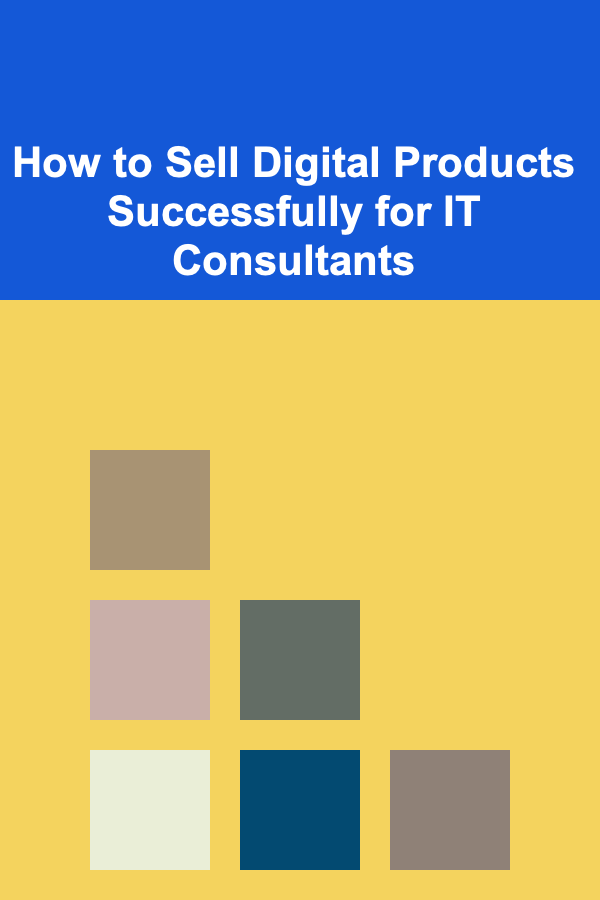
How to Sell Digital Products Successfully for IT Consultants
ebook include PDF & Audio bundle (Micro Guide)
$12.99$8.99
Limited Time Offer! Order within the next:

The digital product market has experienced a tremendous rise in recent years, and IT consultants are uniquely positioned to capitalize on this trend. Whether you're an experienced IT consultant with a wealth of knowledge or just starting out, selling digital products is an excellent way to diversify your income streams and establish your brand as a thought leader in your field. However, creating and selling digital products isn't as simple as just uploading files to a website and waiting for sales. It requires strategy, persistence, and a deep understanding of both your target market and the products you're offering.
In this actionable guide, we will explore the steps that IT consultants can take to sell digital products successfully, from creating the right products to marketing and scaling your sales efforts.
Identify the Right Digital Products to Sell
The first step to selling digital products is deciding what to create. As an IT consultant, you have a deep knowledge of the technology and services your clients need. The key to success in digital product sales is to leverage your expertise to create products that address common pain points or needs in your niche.
Common Digital Products for IT Consultants
Here are some digital product ideas tailored for IT consultants:
- E-books and Guides: Write comprehensive guides on solving common technical issues, implementing IT strategies, or mastering certain technologies. E-books allow you to convey your knowledge in a structured, easily digestible format.
- Online Courses and Tutorials: Share your expertise through video or written tutorials. You can offer step-by-step courses that teach your audience how to use specific software, implement best practices, or optimize their IT infrastructure.
- Templates and Toolkits: Develop downloadable resources, such as IT policy templates, project management templates, network setup guides, or audit checklists. These tools can save your customers time and effort.
- Software or Apps: If you have software development skills, creating niche software solutions or apps that cater to the IT industry can be a lucrative venture.
- Webinars and Workshops: Pre-recorded or live webinars on specific IT topics can be sold as standalone products or part of a subscription package.
When deciding on what to sell, think about your existing clients and what they typically ask for. What problems are they facing that you can solve with a product? The more closely your digital product addresses a pain point, the more likely it is to succeed.
Validate Your Idea Before You Create
Before you invest time and resources into developing a digital product, it's crucial to validate your idea. There's no use in spending hours creating something only to find out there's no demand for it. Validating your product idea helps ensure that your time and effort won't be wasted.
How to Validate Your Digital Product Idea
- Surveys and Polls: Reach out to your existing network, whether it's clients, social media followers, or email subscribers. Ask them directly if they'd be interested in the product you're planning to create.
- Pre-Sell Your Product: Create a landing page that explains the product and its benefits, then offer it for pre-sale at a discounted price. This will give you both validation and early adopters who will be invested in your product's success.
- Social Media and Forums: Look at communities in your niche (LinkedIn groups, Reddit forums, Facebook groups) to see if there's a conversation around your product idea. This is a good way to gauge interest and learn more about the needs of potential customers.
- Competitor Research: Examine what's already being sold in the market. If competitors are successfully selling similar products, it's a good sign that there's a demand for your product. Analyze their strengths and weaknesses to make sure your product offers additional value.
By validating your product early, you can avoid investing in a product that no one is interested in and focus your efforts on ideas that have a real chance of succeeding.
Create High-Quality Content
Once you've validated your idea, it's time to create the product. Quality is paramount, especially when selling digital products that represent your expertise as an IT consultant. You need to ensure that your products are professional, valuable, and high-quality.
Best Practices for Product Creation
- Invest in Professional Tools: Whether you're creating e-books, online courses, or software, investing in the right tools is essential for creating a polished final product. For courses, use platforms like Teachable or Thinkific. For e-books, tools like Scrivener or Canva can help with formatting and design. For software, make sure you follow industry standards in terms of usability and security.
- Ensure User-Friendliness: Your product should be easy for your customers to use. This is especially important for IT products, as they must not only be effective but also intuitive. Create detailed instructions or tutorials to ensure that your customers can fully benefit from your products.
- Offer Ongoing Support: For many IT-related products, ongoing customer support is essential. Consider offering email support, a knowledge base, or a community forum where customers can get help when they need it.
Set Up an E-Commerce System
Once your product is ready, you'll need an effective platform to sell it. Setting up an e-commerce system involves choosing the right tools for payment processing, product delivery, and marketing.
Choosing the Right Platform
- E-commerce Websites: You can sell your digital products on your website using platforms like WooCommerce (for WordPress), Shopify, or BigCommerce. These platforms handle payments, product delivery, and even taxes.
- Marketplaces: Alternatively, you could sell on digital product marketplaces like Gumroad, Etsy (for downloadable products), or Udemy (for courses). These platforms can help you reach a wider audience, but they often take a cut of your sales.
- Automated Delivery Systems: Ensure that your product is automatically delivered to the customer after purchase. Platforms like Gumroad and SendOwl allow you to automate digital product delivery securely.
- Payment Gateways: Make it easy for customers to pay by integrating payment gateways like Stripe, PayPal, or others. The easier the purchasing process, the more likely you are to convert visitors into customers.
Market Your Digital Products
Having a great digital product is just one part of the equation. To sell successfully, you need to market your product effectively and reach the right audience. Digital marketing strategies are essential for IT consultants who want to expand their reach and grow their sales.
Key Marketing Strategies for IT Consultants
- Content Marketing: Write blog posts, create case studies, and share tutorials that demonstrate the value of your products. For example, you can write a blog post about common IT issues and then offer your digital product as a solution.
- Email Marketing: Build an email list by offering free resources, such as e-books or templates, in exchange for email signups. Once you've built your list, send targeted emails about your products, upcoming sales, or special promotions.
- Social Media: Use LinkedIn, Twitter, Facebook, and other platforms to showcase your expertise and promote your products. Regularly share valuable content that highlights your knowledge and positions you as an authority in the IT space.
- Paid Advertising: You can consider running targeted ads on Google, Facebook, or LinkedIn to promote your digital products. Ensure you target the right audience based on job titles, industries, and specific pain points that align with your products.
- Referral Programs: Offer incentives for customers who refer others to your products. Word-of-mouth marketing is powerful, and a well-executed referral program can lead to significant sales.
Scale Your Sales Efforts
Once your digital products are selling and generating income, the next step is scaling your efforts to reach more customers and increase your revenue. Scaling involves increasing your marketing efforts, expanding your product offerings, and exploring new sales channels.
Strategies for Scaling
- Create Additional Products: Once you have one successful product, consider expanding your product range. You can build out a course series or offer premium versions of your existing products.
- Leverage Partnerships: Collaborate with other IT consultants or influencers in your niche to promote your products. Joint ventures and partnerships can introduce your products to new audiences and increase your credibility.
- Automate Marketing: As your sales grow, automating certain aspects of your marketing (like email sequences or social media posts) can save you time and help you reach more people.
- Track Analytics: Use data analytics to monitor which marketing strategies work best and refine your approach. Platforms like Google Analytics, Facebook Ads Manager, and email marketing software can provide insights into customer behavior and conversion rates.
Conclusion
Selling digital products is a powerful way for IT consultants to build passive income streams, establish themselves as thought leaders, and scale their business. By creating valuable, high-quality products, validating your ideas, marketing effectively, and continuously improving your sales strategies, you can achieve success in the competitive digital product marketplace.
Remember, the key to success is persistence. Don't be discouraged by initial setbacks, and always look for ways to improve and adapt. The digital product market is dynamic, and with the right approach, you can turn your expertise into a thriving online business.

Building a Successful Digital Journaling App Business: An Actionable Guide
Read More
How to Create a Playlist That Keeps the Party Vibes Going
Read More
How to Design a Data Analysis Checklist for Visualizing Your Data
Read More
How to Make Small Bathrooms Look Luxurious During Renovation
Read More
How to Select Unique Pendant Lights for Your Kitchen Island
Read More
Make Money by Creating and Selling AI-Powered Products
Read MoreOther Products

Building a Successful Digital Journaling App Business: An Actionable Guide
Read More
How to Create a Playlist That Keeps the Party Vibes Going
Read More
How to Design a Data Analysis Checklist for Visualizing Your Data
Read More
How to Make Small Bathrooms Look Luxurious During Renovation
Read More
How to Select Unique Pendant Lights for Your Kitchen Island
Read More